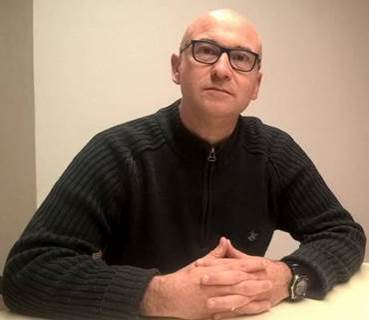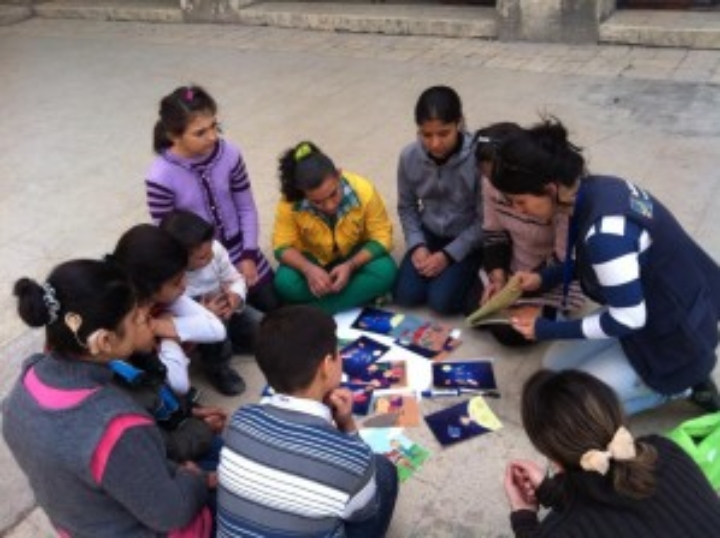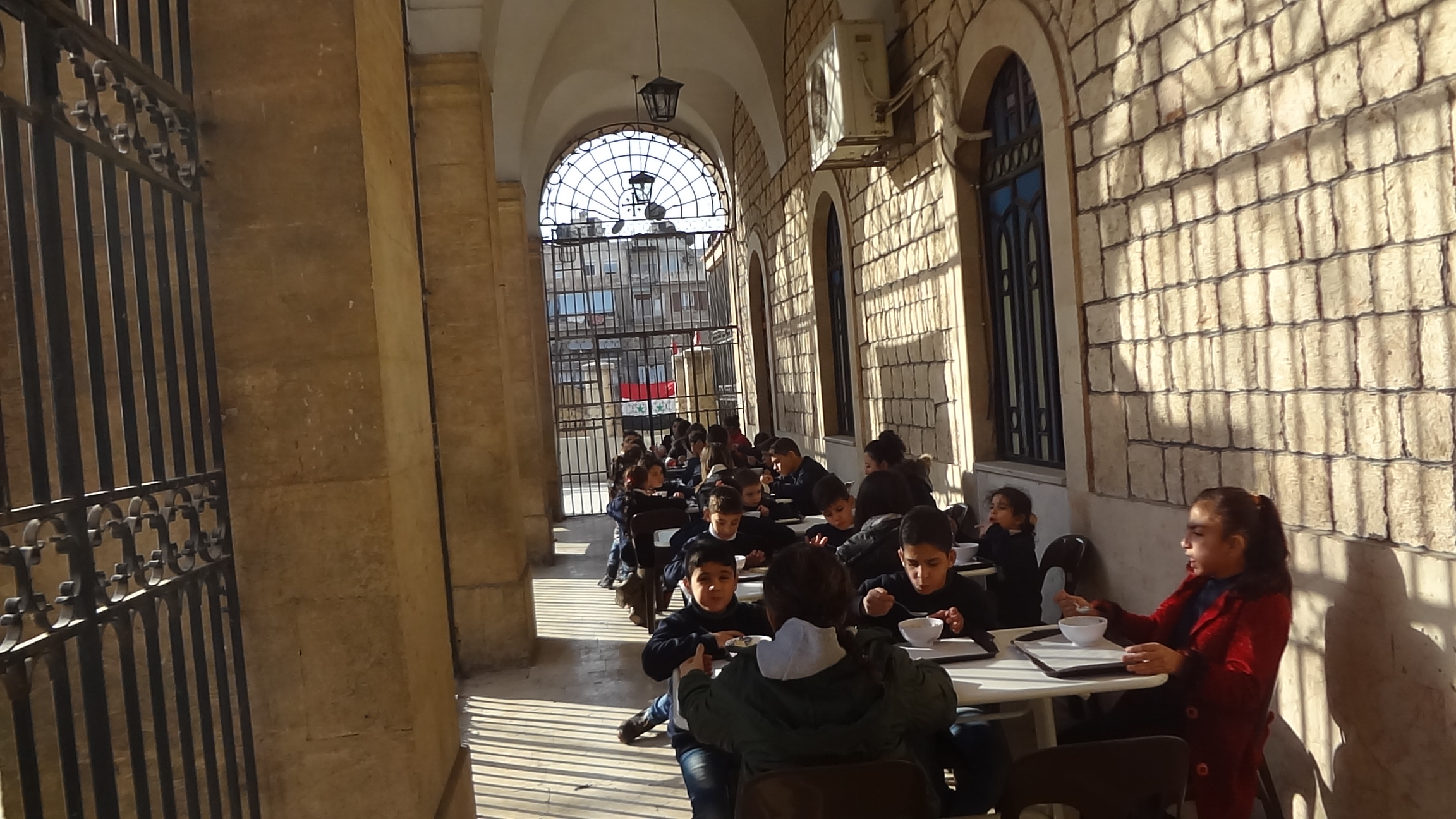
Mar 22, 2018 | Non categorizzato

Jonathan Michelon
https://twitter.com/twitter/statuses/976421224095076352

Mar 22, 2018 | Focolare Worldwide
 The story of Jean and Vivian is a story of love, hope and courage. They met in Aleppo, Syria, in 2000 while belonging to the Focolare Movement. Vivian is a widow with a one year-old son who is totally deaf. Jean is a carpenter and socially active. Their common commitment to living the Gospel and bringing the ideal of a united world to humanity brought them closer and, in 2003 they got married and have four children. Vivian’s first son, Marc, was the motivation behind their adventure. Because of his need for special care, Vivian went to Lebanon where Marc would later follow and stay at a centre run by the Focolare: “It’s really a foretaste of Heaven,” he says. “Living the Gospel in daily life accompanies the whole educational process. The children grow up in this oasis of peace and develop their talents while overcoming their handicap. The dream began to grow in me of setting up an institute myself, in my own city of Aleppo.” Jean supported him in his venture and, in 2005, their small centre was begun. Other larger ones would follow with larger capacity for up to ten children, all from poor families who couldn’t afford the cost. The centre was always in deficit: “Whenever we needed something,” Jean recalls, “we’d go in front of the crucifix and hand over our needs to Him. Providence arrived right on time every time.”
The story of Jean and Vivian is a story of love, hope and courage. They met in Aleppo, Syria, in 2000 while belonging to the Focolare Movement. Vivian is a widow with a one year-old son who is totally deaf. Jean is a carpenter and socially active. Their common commitment to living the Gospel and bringing the ideal of a united world to humanity brought them closer and, in 2003 they got married and have four children. Vivian’s first son, Marc, was the motivation behind their adventure. Because of his need for special care, Vivian went to Lebanon where Marc would later follow and stay at a centre run by the Focolare: “It’s really a foretaste of Heaven,” he says. “Living the Gospel in daily life accompanies the whole educational process. The children grow up in this oasis of peace and develop their talents while overcoming their handicap. The dream began to grow in me of setting up an institute myself, in my own city of Aleppo.” Jean supported him in his venture and, in 2005, their small centre was begun. Other larger ones would follow with larger capacity for up to ten children, all from poor families who couldn’t afford the cost. The centre was always in deficit: “Whenever we needed something,” Jean recalls, “we’d go in front of the crucifix and hand over our needs to Him. Providence arrived right on time every time.”  The breakout of the war in 2011 brought much death and destruction. Jean lost his carpentry, the centre wasn’t having any financial input and many were living on help from the Church and humanitarian organizations. Many left the country and, even though Jean and Vivian were tormented at the thought, they bought tickets to go. But one thing became clearer and clearer in their hearts: they couldn’t leave “their” deaf children and destroy that dream that had come true with so much effort. “On the night before our departure, I stepped into church,” Jeans says, “I had a deep conversation with Jesus, face to face, man to man. He seemed to speak in my heart and asked me not to go: what would the children now? I felt him posing this tragic question to me. I put my children in His hands. I went home and Vivian and I decided to rip up the tickets and stay in the city forever to be a help to the people who needed us.” “We were hopeful that God would accompany and support us in all our future projects and especially in our family,” echoed Vivian, “and that’s what happened.” Now the centre is their second home, their children also take part in the life of the group and Jean works full time “This community has widened our hearts. There is no longer boy or girl, student or teacher, healthy or handicapped, Muslim or Christian. We live in the one love and beneath the same gaze of a God-Love, incarnate, living in our midst.”
The breakout of the war in 2011 brought much death and destruction. Jean lost his carpentry, the centre wasn’t having any financial input and many were living on help from the Church and humanitarian organizations. Many left the country and, even though Jean and Vivian were tormented at the thought, they bought tickets to go. But one thing became clearer and clearer in their hearts: they couldn’t leave “their” deaf children and destroy that dream that had come true with so much effort. “On the night before our departure, I stepped into church,” Jeans says, “I had a deep conversation with Jesus, face to face, man to man. He seemed to speak in my heart and asked me not to go: what would the children now? I felt him posing this tragic question to me. I put my children in His hands. I went home and Vivian and I decided to rip up the tickets and stay in the city forever to be a help to the people who needed us.” “We were hopeful that God would accompany and support us in all our future projects and especially in our family,” echoed Vivian, “and that’s what happened.” Now the centre is their second home, their children also take part in the life of the group and Jean works full time “This community has widened our hearts. There is no longer boy or girl, student or teacher, healthy or handicapped, Muslim or Christian. We live in the one love and beneath the same gaze of a God-Love, incarnate, living in our midst.”





 The story of Jean and Vivian is a story of love, hope and courage. They met in Aleppo, Syria, in 2000 while belonging to the Focolare Movement. Vivian is a widow with a one year-old son who is totally deaf. Jean is a carpenter and socially active. Their common commitment to living the Gospel and bringing the ideal of a united world to humanity brought them closer and, in 2003 they got married and have four children. Vivian’s first son, Marc, was the motivation behind their adventure. Because of his need for special care, Vivian went to Lebanon where Marc would later follow and stay at a centre run by the Focolare: “It’s really a foretaste of Heaven,” he says. “Living the Gospel in daily life accompanies the whole educational process. The children grow up in this oasis of peace and develop their talents while overcoming their handicap. The dream began to grow in me of setting up an institute myself, in my own city of Aleppo.” Jean supported him in his venture and, in 2005, their small centre was begun. Other larger ones would follow with larger capacity for up to ten children, all from poor families who couldn’t afford the cost. The centre was always in deficit: “Whenever we needed something,” Jean recalls, “we’d go in front of the crucifix and hand over our needs to Him. Providence arrived right on time every time.”
The story of Jean and Vivian is a story of love, hope and courage. They met in Aleppo, Syria, in 2000 while belonging to the Focolare Movement. Vivian is a widow with a one year-old son who is totally deaf. Jean is a carpenter and socially active. Their common commitment to living the Gospel and bringing the ideal of a united world to humanity brought them closer and, in 2003 they got married and have four children. Vivian’s first son, Marc, was the motivation behind their adventure. Because of his need for special care, Vivian went to Lebanon where Marc would later follow and stay at a centre run by the Focolare: “It’s really a foretaste of Heaven,” he says. “Living the Gospel in daily life accompanies the whole educational process. The children grow up in this oasis of peace and develop their talents while overcoming their handicap. The dream began to grow in me of setting up an institute myself, in my own city of Aleppo.” Jean supported him in his venture and, in 2005, their small centre was begun. Other larger ones would follow with larger capacity for up to ten children, all from poor families who couldn’t afford the cost. The centre was always in deficit: “Whenever we needed something,” Jean recalls, “we’d go in front of the crucifix and hand over our needs to Him. Providence arrived right on time every time.”  The breakout of the war in 2011 brought much death and destruction. Jean lost his carpentry, the centre wasn’t having any financial input and many were living on help from the Church and humanitarian organizations. Many left the country and, even though Jean and Vivian were tormented at the thought, they bought tickets to go. But one thing became clearer and clearer in their hearts: they couldn’t leave “their” deaf children and destroy that dream that had come true with so much effort. “On the night before our departure, I stepped into church,” Jeans says, “I had a deep conversation with Jesus, face to face, man to man. He seemed to speak in my heart and asked me not to go: what would the children now? I felt him posing this tragic question to me. I put my children in His hands. I went home and Vivian and I decided to rip up the tickets and stay in the city forever to be a help to the people who needed us.” “We were hopeful that God would accompany and support us in all our future projects and especially in our family,” echoed Vivian, “and that’s what happened.” Now the centre is their second home, their children also take part in the life of the group and Jean works full time “This community has widened our hearts. There is no longer boy or girl, student or teacher, healthy or handicapped, Muslim or Christian. We live in the one love and beneath the same gaze of a God-Love, incarnate, living in our midst.”
The breakout of the war in 2011 brought much death and destruction. Jean lost his carpentry, the centre wasn’t having any financial input and many were living on help from the Church and humanitarian organizations. Many left the country and, even though Jean and Vivian were tormented at the thought, they bought tickets to go. But one thing became clearer and clearer in their hearts: they couldn’t leave “their” deaf children and destroy that dream that had come true with so much effort. “On the night before our departure, I stepped into church,” Jeans says, “I had a deep conversation with Jesus, face to face, man to man. He seemed to speak in my heart and asked me not to go: what would the children now? I felt him posing this tragic question to me. I put my children in His hands. I went home and Vivian and I decided to rip up the tickets and stay in the city forever to be a help to the people who needed us.” “We were hopeful that God would accompany and support us in all our future projects and especially in our family,” echoed Vivian, “and that’s what happened.” Now the centre is their second home, their children also take part in the life of the group and Jean works full time “This community has widened our hearts. There is no longer boy or girl, student or teacher, healthy or handicapped, Muslim or Christian. We live in the one love and beneath the same gaze of a God-Love, incarnate, living in our midst.”